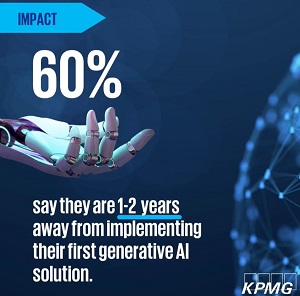News
Most U.S. Execs 'A Year or Two Away' from Using Generative AI
A new survey of corporate executives confirms the obvious -- generative AI will have an enormous impact on business -- but also reveals that most aren't ready to use it just quite yet.
The survey was conducted by KPMG U.S. last month.
"Almost two-thirds (65 percent) of the 225 U.S. executives surveyed in the last two weeks of March believe generative AI will have a high or extremely high impact on their organization in the next three to five years, far above every other emerging technology," KPMG U.S. said in a post yesterday (April 24). "Yet nearly the same percentage, 60 percent, say they are still a year or two away from implementing their first generative AI solution."
 [Click on image for larger view.] A Year or Two Away (source: KPMG U.S.).
[Click on image for larger view.] A Year or Two Away (source: KPMG U.S.).
Hurdles to adoption include determining clear business cases and installing the right technology, talent and governance.
Other concerns are risk and responsible use of generative AI. As we reported last month, thousands of industry figures, including Elon Musk and Steve Wozniak, have called to Pause Giant AI Experiments for six months in order to jointly develop and implement a set of shared safety protocols for advanced AI design and development that are rigorously audited and overseen by independent outside experts.
However, like generative AI itself, execs aren't progressing very fast on risk/responsible use initiatives, as KPMG U.S. noted:
- Only 6 percent of organizations report having a dedicated team in place for evaluating risk and implementing risk mitigation strategies as part of their overall generative AI strategy
- Another 25 percent of organizations are putting risk management strategies in place, but it is a work in progress
- Nearly half (47 percent) say they are in the initial stages of evaluating risk and mitigation strategies
- Nearly a quarter (22 percent) have not yet started evaluating risk and mitigation strategies
- Only 5 percent report having a mature responsible AI governance program in place
- Nearly half (49 percent) say they intend to stand one up but have not done so yet
- Another 19 percent say an AI governance program is in process or has been partially implemented
- More than a quarter, (27 percent), say they do not currently see a need or have not reached enough scale to merit a responsible AI governance program
- Almost 4 in 10 executives (39 percent) believe that generative AI could lead to decreased social interactions and human connections with coworkers that may have negative impacts on the workforce
- Another 32 percent report a concern that they will see increased mental health issues among their workforce due to the stress of job loss and uncertainty about the future
There is lack of progress in mitigating risk and ensuring responsible use even though nearly half of respondents (45 percent) said that generative AI can have a negative impact on their organization's trust if the appropriate risk management tools are not implemented.
"Generative AI, like many technologies, creates great opportunities for organizations," KPMG U.S. Trusted Imperative Leader Emily Frolick said. "However, the ease of use and open nature of generative AI amplifies the risk. As organizations are exploring potential use cases, giving attention to the risks or exposures associated with generative AI should be equally prioritized."
On the positive side of things, 72 percent agree that generative AI can play a critical role in building and maintaining stakeholder trust.
"Generative AI has the potential to transform businesses across industries," KPMG U.S. said. "However, executives still see major hurdles to adoption, such as determining clear business cases and installing the right technology, talent, and governance.
"As generative AI evolves, executives must prioritize its rapid implementation to stay competitive, while ensuring that it is deployed in a responsible and ethical manner."
About the Author
David Ramel is an editor and writer at Converge 360.